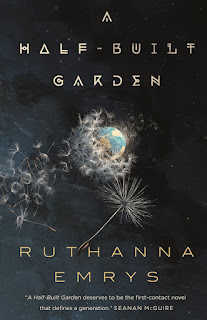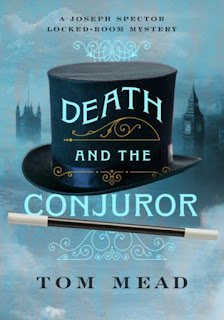 appeared in a number of venues, including Strange Horizons, Analog, and Tor.com. She is the author of the Innsmouth Legacy series, which began with Winter Tide.
appeared in a number of venues, including Strange Horizons, Analog, and Tor.com. She is the author of the Innsmouth Legacy series, which began with Winter Tide.
Emrys applied the Page 69 Test to her new novel, A Half-Built Garden, and reported the following:
On page 69, Judy Wallach-Stevens has just come back from talking with aliens – made more difficult by an unprecedented network crash - to find representatives from an exiled megacorporation in her dining room. They’d really like to get involved in first contact as well, and think they can do a better job of it:Visit Ruthanna Emrys's website.The two associates looked at each other and sat, though they didn’t eat. Adrien leaned against the wall, arms folded casually. Mallory spoke: “The common feed says these aliens – we’re calling them Ringers? – are nation-style territorialists. They argue from shared ideals, and use those ideals as an excuse to make others live as they do. I know the dandelion networks don’t trust us.” I flagged that in my recording, the first point where any of them admitted our existence. “But corporate strength has always come from transmuting the threat of force into softer trade. If we all eat the same food, play the same games, they’ll gloss over any difference in values.”For A Half-Built Garden, page 69 has the disadvantage of not including any actual aliens. However, this page does introduce a couple of big conflicts that play out through the whole book.
“They live in space stations,” added Kelsey. With enough trade, they’ll see our interest in planets as simply a place we aren’t in competition. Not that we can’t compete in space, too. Why not get a few stations of our own? Factories with shields of vacuum – think of everything we could accomplish. But first we need to figure out what goods appeal to them. What they’d want from us, if they knew it was on offer.”
So much nuance and threat tangled in those reasonable-sounding suggestions. My undrained mesh stretched its memory to the breaking point. Still I cued problems and questions, ready to go as soon as the network came up, while I thought about how to respond.
When it did come up, I stalled out. It was only a moment – a stutter of status in the corner of my vision. Recordings and questions surged with that flash before it flickered away, and I wondered too late if thousands of cued uploads from across the region had overwhelmed the launch. Redbug would know. Maybe their team could lay down safeties, titrate activity for the next reboot.
They stomped out through the living room curtains, trailed by the tech team, and I braced myself. But their anger wasn’t for me. “What are they doing here?” demanded Redbug.
The Asterion representatives see first contact as an opportunity to regain the power that corporations lost in the Dandelion Revolution. If they gain control of the negotiations, they could dominate humanity’s spread among the stars. This is a threat to everyone else because they have no particular attachment to human survival on Earth. But it puts them much more in line with the Dyson-Sphere-dwelling Ringers – when the Ringers are already disturbed by the watershed networks’ attachment to their planet.
The watersheds are also suspicious (with cause) that their network crash stems from corporate sabotage. It’s never happened before, and the corporations are a lot more likely to get their way with the watersheds’ main decision-making technology in chaos.
On the other hand, if the watersheds could prove that Asterion is at fault, the Ringers would be a lot less likely to want to work with the corporations, shared goals or no shared goals. When you live on a space station, you really don’t appreciate people who are prone to breaking your technology when they don’t get their way!
One thing that doesn’t show up on this page is the role that parenting plays in the book. The Ringers treat parenthood as an indicator of leadership ability. This is at least in part because for one of the species involved, a lot of status negotiation is required to determine who plays what role in reproduction!
Judy happens to have her baby along when she first encounters the Ringers, and they latch onto her as a leader for the human side of first contact, despite her dubious qualifications otherwise. The varied ways that human cultures handle parenting lead to a lot of conflict, both between humans and between species. Flip forward ten pages, and you’ll find the Ringers being very suspicious about Asterion’s unwillingness to drag kids along on international jaunts.
Q&A with Ruthanna Emrys.
--Marshal Zeringue




















